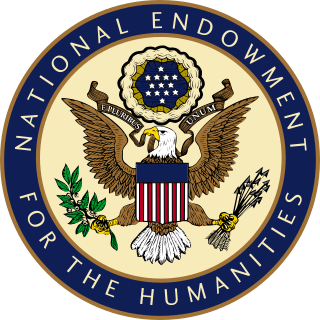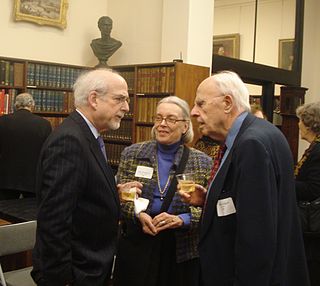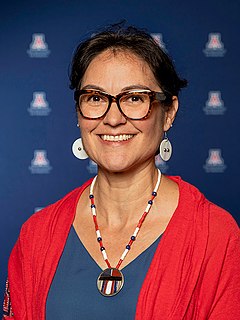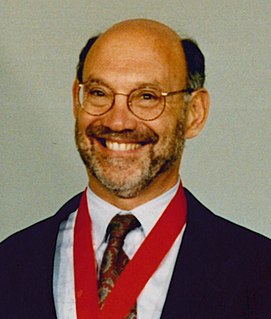
The National Endowment for the Humanities (NEH) is an independent federal agency of the U.S. government, established by the National Foundation on the Arts and the Humanities Act of 1965, dedicated to supporting research, education, preservation, and public programs in the humanities. The NEH is housed at 400 7th St SW, Washington, D.C. From 1979 to 2014, NEH was at 1100 Pennsylvania Avenue, N.W., Washington, D.C. in the Nancy Hanks Center at the Old Post Office.

The National Humanities Medal is an American award that annually recognizes several individuals, groups, or institutions for work that has "deepened the nation's understanding of the humanities, broadened our citizens' engagement with the humanities, or helped preserve and expand Americans' access to important resources in the humanities."

Anne Arundel Community College (AACC) is a public community college in Arnold, Maryland. The college was founded in 1961 and is accredited by the Middle States Commission on Higher Education. The community college offers letters of recognition, 46 associate degree programs, and 62 certificate programs through its five schools.
Charles Frankel was an American philosopher, Assistant U.S. Secretary of State, professor and founding director of the National Humanities Center.
Roy Rosenzweig Center for History and New Media (RRCHNM), formerly the Center for History and New Media (CHNM) is a research center specializing in history and information technology at George Mason University (GMU) in Fairfax County, Virginia. It was one of the first digital history centers in the world, established by Roy Rosenzweig in 1994 to use digital media and information technology to democratize history: to incorporate multiple voices, reach diverse audiences, and encourage popular participation in presenting and preserving the past. Its current director is T. Mills Kelly.
Lorain County Community College (LCCC) is a public community college in the city of Elyria in Lorain County, Ohio, with learning centers in Wellington, North Ridgeville, and Lorain. In addition to associate degrees and certificates, students can earn bachelor's and master's degrees on campus through the college's partnerships with universities.

Bruce Milan Cole was a longtime professor of art history at Indiana University, a Senior Fellow at the Ethics and Public Policy Center in Washington, D.C., a member of the Eisenhower Memorial Commission, and the eighth Chair of the National Endowment for the Humanities.
William Reynolds Ferris is an American author and scholar and former chairman of the National Endowment for the Humanities. With Judy Peiser he co-founded the Center for Southern Folklore in Memphis, Tennessee; he was the founding director of the Center for the Study of Southern Culture at the University of Mississippi, and is co-editor of The Encyclopedia of Southern Culture.
Syracuse University Press, founded in 1943, is a university press that is part of Syracuse University. It is a member of the Association of American University Presses.

Spark Media is an American independent multimedia and documentary production house based in Washington, D.C., United States.
The Jefferson Lecture in the Humanities is an honorary lecture series established in 1972 by the National Endowment for the Humanities (NEH). According to the NEH, the Lecture is "the highest honor the federal government confers for distinguished intellectual achievement in the humanities."

William Drea "Bro" Adams is an American educator and advocate for the humanities. He was the tenth Chair of the National Endowment for the Humanities from 2014 to 2017. He served as the 14th President of Bucknell University from 1995 to 2000, and as the 19th President of Colby College from 2000 to 2014.
Robert Anthony Orsi is a scholar of American history and Catholic studies who is the Grace Craddock Nagle Chair professor at Northwestern University. Before coming to Northwestern, Orsi chaired the department of religious studies at Harvard University.

The Center for Public History and Digital Humanities is a digital humanities center in Cleveland, Ohio, based in the Department of History at Cleveland State University.

The College of Arts, Humanities and Social Sciences at the University of Maryland, Baltimore County (CAHSS) has 22 departments, and offers 30 Bachelor's, 16 Master's, and 6 Ph.D. programs. The college also includes several scholarship programs; the Linehan Artist Scholars Program, the Humanities Scholars Program, and the Sondheim Public Affairs Scholars Program. The college oversees several centers; the Dresher Center for Humanities, the Imaging Research Center, and the Maryland Institute for Policy Analysis and Research.

Carole McAlpine Watson is an American academic who served twice as acting Chair of the National Endowment for the Humanities, first in 2009 and again in 2013 to 2014. Watson studied African American literature and authored Her Prologue, a scholarly bibliography of novels by African American women published between 1859 and 1965.

Jon Parrish Peede is an American book editor and literary review publisher, who served as the chairman of the National Endowment for the Humanities from 2018 to 2021.
The Mississippi Writers Trail is a series of historical markers which celebrate the literary, social, historical, and cultural contributions of Mississippi's most acclaimed and influential writers. An advisory committee of state cultural agencies oversees the process of installing historical markers in places of significance to an author's life. To emphasize the literary focus of the trail, the markers are cast in the shape of an open book and display information about the author's life with the goal of educating the public about the legacy of Mississippi writers.

Shelly C. Lowe is an American academic administrator serving as the chair of the National Endowment for the Humanities.

David A. Berry is an American educator and administrator, known for co-founding and leading the Community College Humanities Association. For his efforts to strengthen the humanities curricula in community colleges across the United States, he was awarded the National Humanities Medal in 1997.












